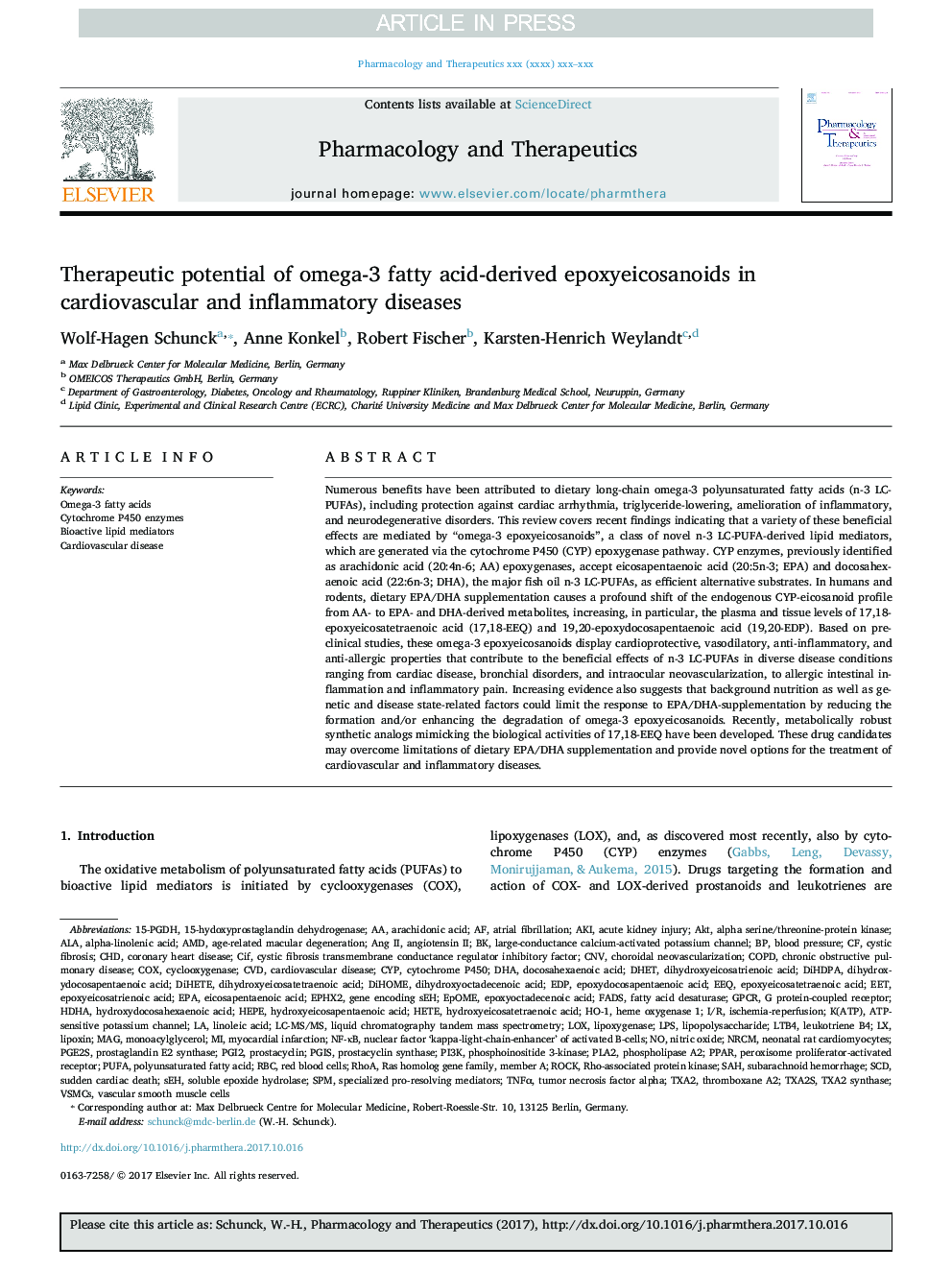| کد مقاله | کد نشریه | سال انتشار | مقاله انگلیسی | نسخه تمام متن |
|---|---|---|---|---|
| 8536912 | 1560922 | 2018 | 28 صفحه PDF | دانلود رایگان |
عنوان انگلیسی مقاله ISI
Therapeutic potential of omega-3 fatty acid-derived epoxyeicosanoids in cardiovascular and inflammatory diseases
ترجمه فارسی عنوان
پتانسیل درمان اپوکسی ایکسانوویدهای مشتق شده از اسید چرب امگا 3 در بیماریهای قلبی عروقی و التهابی
دانلود مقاله + سفارش ترجمه
دانلود مقاله ISI انگلیسی
رایگان برای ایرانیان
کلمات کلیدی
EPANF-κBPI3KCNVTNFαLPSCOXAKICyPSCDHO-1RhoAAMDALARBCMAGmonoacylglycerolPPARSPMGPCREDPSAHFADS15-PGDHCHDLTB4PLA2TxA2CIFVSMCsPGI2PGISEPHX2DiHETEEEQHEPENRCMepoxyoctadecenoic acidnuclear factor ‘kappa-light-chain-enhancer’ of activated B-cellsdihydroxydocosapentaenoic acidHDHAprostaglandin E2 synthaseRed blood cells - سلولهای قرمز خونDHET - dhetI/R - I / RLC-MS/MS - LC-MS / MSChoroidal neovascularization - neovascularization choroidalras homolog gene family, member A - ras homolog gene family، عضو AsEH - SEHacute kidney injury - آسیب حاد کلیهcyclooxygenase - آنزیم سیکلواکسیژنازphospholipase A2 - آنزیم فسفولیپاز A2 cytochrome P450 enzymes - آنزیم های سیتوکروم P450Myocardial infarction - آنفارکتوس میوکاردAngiotensin II - آنژیوتانسین دوAkt - آکتArachidonic acid - اسید آراشیدونیکalpha-linolenic acid - اسید آلفا لینولنیکepoxyeicosatrienoic acid - اسید اپوکسی اسیاتریتروئینepoxydocosapentaenoic acid - اسید اپوکسی سودوکواسپنتائوئیکepoxyeicosatetraenoic acid - اسید اپوکسییکواستاترونیکEicosapentaenoic acid - اسید ایکوزاپنتانوئیکdocosahexaenoic acid - اسید داکوزاگزوائونیکdihydroxyeicosatrienoic acid - اسید دی هیدروکسی اتیلنیکdihydroxyeicosatetraenoic acid - اسید دی هیدروکسی ایکواستاترونیکdihydroxyoctadecenoic acid - اسید دی هیدروکسیوکتاکتنوئیکFatty acid desaturase - اسید لاکتیک اسیدLinoleic acid - اسید لینولئیکhydroxyeicosatetraenoic acid - اسید هیدروکسی اسیستاترونیکhydroxyeicosapentaenoic acid - اسید هیدروکسی ایکوزاپنتانوئیکhydroxydocosahexaenoic acid - اسید هیدروکسی سدوکاواگزازوئیکOmega-3 fatty acids - اسید چرب امگا ۳ Polyunsaturated fatty acid - اسید چرب غیر اشباعPUFA - اسید چرب چند غیراشباعEpOME - اپومLOX - اکسیژن مایعischemia-reperfusion - ایسکمی-رپرفیوژنcoronary heart disease - بیماری عروق کرونر قلبcardiovascular disease - بیماری قلب و عروقیCOPD - بیماری مزمن انسدادی ریهChronic obstructive pulmonary disease - بیماری مزمن انسدادی ریهThromboxane A2 - ترومبوکسیان A2tumor necrosis factor alpha - تومور نکروز عامل آلفاEET - خوردنSubarachnoid hemorrhage - خونریزی زیر عنکبوتیهAng II - دومDHA - دوکوساهگزائنوئیک اسیدDiHOME - دیهومCVD - رسوب دهی شیمیایی بخار Vascular smooth muscle cells - سلول های عضلانی صاف عروقیage-related macular degeneration - سن تخریب ماکولا مربوط به سن استProstacyclin synthase - سنتاز پروستات سیکلینCytochrome P450 - سیتوکروم پی۴۵۰phosphoinositide 3-kinase - فسفینوزیتید 3-کینازBlood pressure - فشارخونCystic fibrosis - فیبروز کیستیکAtrial fibrillation - فیبریلاسیون دهلیزیLeukotriene B4 - لوکوترین B4lipoxygenase - لیپواکسیژنازlipopolysaccharide - لیپوپلی ساکاریدlipoxin - لیپوکینSudden cardiac death - مرگ ناگهانی قلبیNitric oxide - نیتریک اکسیدHETE - هفتهheme oxygenase 1 - همای اکسیژناز 1Soluble epoxide hydrolase - هیدرولاز اپوکسی سدیم حلالSpecialized pro-resolving mediators - واسطه های تخصصی حل و فصل پروندهRho-associated protein kinase - پروتئین کیناز وابسته به Rhoprostacyclin - پروستاسیکلینneonatal rat cardiomyocytes - کاردیومیوسیت های موش صحرایی نوزادانATP-sensitive potassium channel - کانال پتاسیم حساس به ATPLarge-conductance calcium-activated potassium channel - کانال پتاسیم فعال کلسیم با کارایی بالاliquid chromatography tandem mass spectrometry - کروماتوگرافی مایع اسپکترومتری دو طرفهperoxisome proliferator-activated receptor - گیرنده فعال فعال پروکسیومG protein-coupled receptor - گیرندههای جفتشونده با پروتئین جیRock - یا راک
موضوعات مرتبط
علوم پزشکی و سلامت
داروسازی، سم شناسی و علوم دارویی
داروشناسی
چکیده انگلیسی
Numerous benefits have been attributed to dietary long-chain omega-3 polyunsaturated fatty acids (n-3 LC-PUFAs), including protection against cardiac arrhythmia, triglyceride-lowering, amelioration of inflammatory, and neurodegenerative disorders. This review covers recent findings indicating that a variety of these beneficial effects are mediated by “omega-3 epoxyeicosanoids”, a class of novel n-3 LC-PUFA-derived lipid mediators, which are generated via the cytochrome P450 (CYP) epoxygenase pathway. CYP enzymes, previously identified as arachidonic acid (20:4n-6; AA) epoxygenases, accept eicosapentaenoic acid (20:5n-3; EPA) and docosahexaenoic acid (22:6n-3; DHA), the major fish oil n-3 LC-PUFAs, as efficient alternative substrates. In humans and rodents, dietary EPA/DHA supplementation causes a profound shift of the endogenous CYP-eicosanoid profile from AA- to EPA- and DHA-derived metabolites, increasing, in particular, the plasma and tissue levels of 17,18-epoxyeicosatetraenoic acid (17,18-EEQ) and 19,20-epoxydocosapentaenoic acid (19,20-EDP). Based on preclinical studies, these omega-3 epoxyeicosanoids display cardioprotective, vasodilatory, anti-inflammatory, and anti-allergic properties that contribute to the beneficial effects of n-3 LC-PUFAs in diverse disease conditions ranging from cardiac disease, bronchial disorders, and intraocular neovascularization, to allergic intestinal inflammation and inflammatory pain. Increasing evidence also suggests that background nutrition as well as genetic and disease state-related factors could limit the response to EPA/DHA-supplementation by reducing the formation and/or enhancing the degradation of omega-3 epoxyeicosanoids. Recently, metabolically robust synthetic analogs mimicking the biological activities of 17,18-EEQ have been developed. These drug candidates may overcome limitations of dietary EPA/DHA supplementation and provide novel options for the treatment of cardiovascular and inflammatory diseases.
ناشر
Database: Elsevier - ScienceDirect (ساینس دایرکت)
Journal: Pharmacology & Therapeutics - Volume 183, March 2018, Pages 177-204
Journal: Pharmacology & Therapeutics - Volume 183, March 2018, Pages 177-204
نویسندگان
Wolf-Hagen Schunck, Anne Konkel, Robert Fischer, Karsten-Henrich Weylandt,
